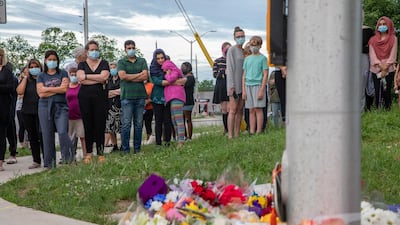What Canadians abroad tend to miss most about their homeland is the feeling of safety. Not the low-crime, leave-your-doors-unlocked kind of safety – those are weary cliches for brand Canada. There are plenty of ways and places and times in Canada to be unsafe in your own way.
No, it’s the mental safety: the prototypically Canadian sensibility in a world of bad news that, actually, you are at home and everything is fine.
Most of us who grew up in Canada have become good at making ourselves feel that way. So many of us came from places we now view with a sense of forlorn pity. And the ones who didn’t come from elsewhere rest comfortably – sometimes smugly, sometimes a little jealously, but always comfortably – in the happenstance that they’re not in America.
Every so often, one of our number breaks the spell. On Sunday, 20-year-old Nathaniel Veltman of London, Ontario drove his black pickup truck onto a suburban curb and smashed it into a family, killing four members from three of its generations, leaving alive only a nine-year-old boy. Veltman sought to kill them, London police allege, because they looked foreign.
They looked foreign because, well, they used to be. The idea that they and others like them are no longer foreign is a national mantra, drilled into Canadians from a young age at school, on TV and in the stump speeches of wide-eyed politicians. The US proudly calls itself a melting pot, but Canada is a mosaic, goes the refrain in grade 10 civics class. There isn’t much debate over what that means exactly or why it’s better.
Sometimes the sentiment is so genuine that it strikes you deep in the heart and you want to cry. When Canada was debating refugee resettlement a couple of years ago, the mayor of far-north, edge-of-the-world Dawson City, Yukon told a reporter: “Canadians are born all over the world. It just sometimes takes them a bit of time to get here.”
It just isn’t like that in the US, which is where I was born and where we tell ourselves all the Nathaniel Veltmans of North America tend to live. When I was an 11-year-old kid there, in North Carolina, from a Muslim family, living in the aftermath of 9/11, I was told by my parents what they were told at the mosque: “keep a low profile”.
The day I immigrated to Canada, I was sent by officers to a balloon-filled room at Toronto airport where every Canadian’s white grandmother had volunteered to greet me and the other new immigrants coming in that day. “Thank you for choosing us,” they said. I wanted to cry then, too.
That’s the mental safety I’m talking about – the one Veltman’s victims undoubtedly had on Sunday, somewhere in the back of their minds, as they were out for a family stroll. It’s a stream of messaging that papers over everything – the fact that one third of young black Canadians in Ontario are born in poverty; the fact that Arab Canadians have double-the-average unemployment and below-average wages; the fact that native Canadians are treated perhaps even worse than those of us who just arrived.
Every so often, the messaging doesn't stick. It didn't stick in 2017, when a white supremacist shot dead six worshippers at a mosque in Quebec City. Nor last September, when Mohamed-Aslim Zafis, the caretaker of a mosque in Etobicoke, a Toronto suburb, was stabbed to death by a white supremacist. Nor did it stick for Nathaniel Veltman. Whatever he heard from Canada's system, his victims still looked foreign. They never stood a chance.
Sometimes it doesn’t stick in the immigrant communities either. There have been plenty of young Canadian men from Muslim families over the years who plotted their own attacks at home or joined terrorist groups abroad, some of them acutely aware of how foreign they looked.
The easy takeaway from all of this is that words are not enough, and that Canada must act to heal division and hatred and all of those other societal ills its politicians will name breathlessly in the days to come.
But perhaps, I would suggest, the words are too much. The feel-good platitudes describe the Canada of our fantasies, but not the one that exists today. Better to speak humbly about the Canada that is – a complicated country, like all of the countries from which it is built.
Canadians are not born everywhere in the world, just waiting to join the family they never knew they had in Toronto or Montreal or Vancouver. Many of them were born on the outside and are trying to join a society that is mostly nice, but mostly white – and so they will be foreign to some degree, and that carries a price that cannot be papered over.
The nine-year-old boy Veltman left alive, presumably unwittingly, has paid this price in the form of his entire family. He’ll grow up knowing that a man once thought he, a Canadian, looked foreign. He’ll sit in grade 10 civics class and hear about the mosaic, and he’ll know that it’s missing four pieces because that man thought they didn’t belong.
Sulaiman Hakemy is opinion editor at The National















